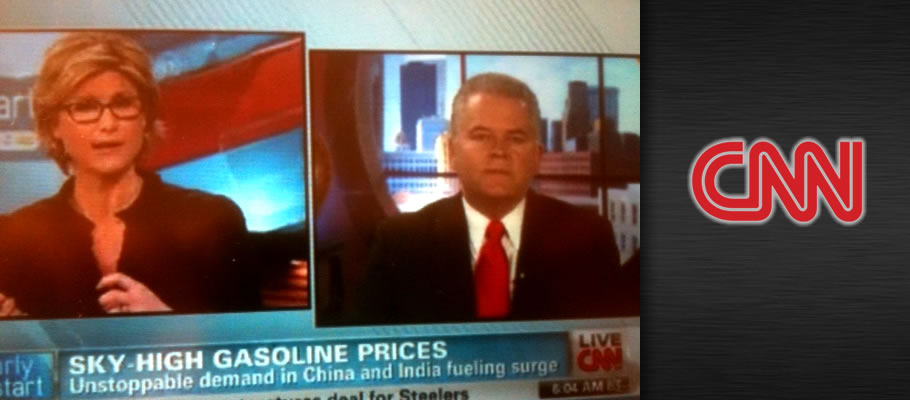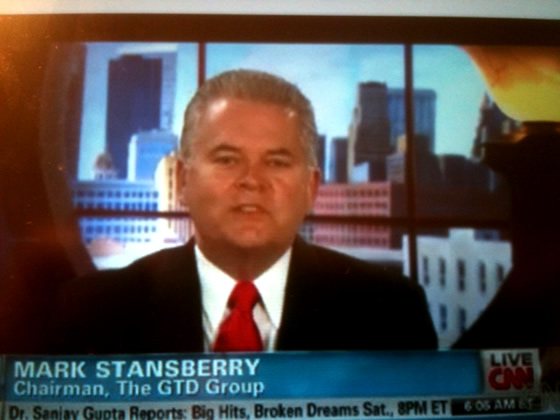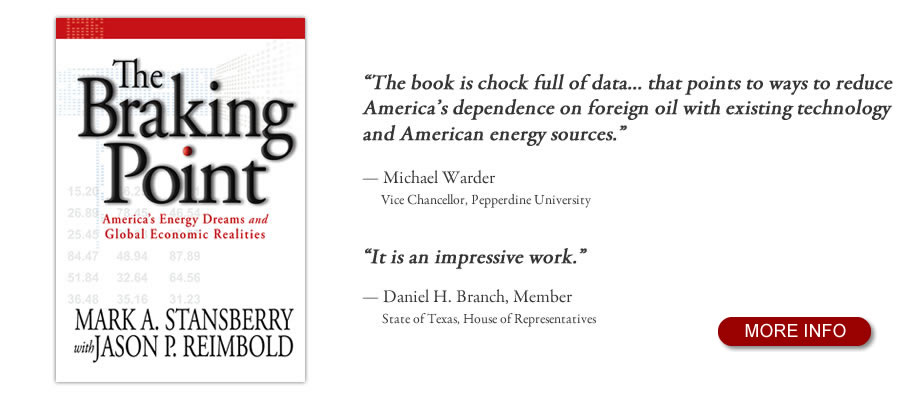In late 2006, U.S. headlines read:
Oil Prices Creep Higher on Terror Fears
Nigeria Villagers Seize 3 Oil Platforms
Australia Faces Blackouts
America, and the world, is facing an energy crisis. The good news is that America’s energy problems can be solved. The bad news is that the energy crisis does not exist in a vacuum, it is not temporary, and it will not fix itself. Failure to effectively deal with this problem now will threaten our nation’s economic prosperity, compromise our national security, and could radically alter our way of life. The major conditions that dramatically define the energy problem facing America today are: peaking world oil production, energy security, and inadequacies in domestic and international energy policy. This book is a primer on those conditions and is meant to inspire a discussion in this country about the necessary changes which must take place in our industries, consumer patterns, and our government if we are to meet the challenges ahead. Communication between consumers, policy makers, and industry is essential if we are to be successful. The situation is complex however, and there are many factors contributing to what could lead to a time when social and economic progress is halted due to a lack of energy—the braking point.
Note: MCF is one thousand cubic feet of gas. MMCF is one million cubic feet of gas.
WHAT OTHERS ARE SAYING:
“It is a great reflection on the world energy situation.”
— V. Burns Hargis
President, Oklahoma State University
“It is an impressive work.”
— Daniel H. Branch, Member
State of Texas, House of Representatives
“It looks like something every member of Congress needs to read.”
— Alex Mills
Wichita Falls, Texas
“The book is chock full of data… that points to ways to reduce America’s dependence on foreign oil with existing technology and American energy sources.”
— Michael Warder
Vice Chancellor, Pepperdine University
“I enjoyed reading the article which briefly discusses concerns upon which the book focuses. There is no doubt that the book will have a substantial impact upon the oil and gas industry as well as other private and public sectors.”
– Kathy Taylor
Former Mayor of Tulsa, Oklahoma, February 22, 2008 (Referring to Feb 4th, 2008 Tulsa Business Journal article)
“the book covers the concept of peak oil production, understanding the past reactions of the member countries of the Organization of Petroleum Exporting Countries, the myth behind Big Oil, the world’s thirst for energy and the braking point.”
– Newsline, Texas Alliance, December, 2007
“Geologic alternatives (for oil and gas) are shrinking. This will be more of an impediment in the future, but eventually, we will have accessed all of the most significant discoveries.”
“As oil is an important strategic global commodity and affects daily life everywhere, a secular and democratic Iran must in the future take the lead to firstly prevent OPEC from ever using oil or gas as a political weapon and secondly to encourage OPEC member countries in organizing an effective and useful dialogue with oil consuming countries.”
— HRH Reza Pahlavi
ABOUT THE AUTHORS
Mark A. Stansberry is Chairman of The GTD Group (www.thegtdgroup.com)and has been active in the energy industry for the past thirty years. He has been active in banking, real estate development, international government relations and business ventures.He is President of The International Society of The Energy Advocates, Chairman of Oklahoma’s State Chamber Energy Council, and Chairman and Founder of the International Energy Policy Conference.
His is a graduate of Oklahoma Christian University, and his memberships include Oklahoma Independent Petroleum Association, Independent Petroleum Association of America, Texas Alliance of Energy Producers, and the Association of International Petroleum Negotiators. He has testified before the U. S. Senate Energy and Natural Resources Committee along with other regulatory bodies, and he served on the staff of former U. S. Senator Dewey F. Bartlett, 1975-76. In 1991, he co-authored the handbook entitled The Acquisition Process and Due Diligence: Minimize Risk & Maximize Return!
He was appointed by Oklahoma Governor Frank Keating to serve as a member of the Board of Regents of the Regional University System of Oklahoma and has served as Chairman. In addition, he has served Chairman of the Governor’s International Team, Board of Directors of People to People, Board of Trustees of the Fund for American Studies, Board of Trustees for Oklahoma Christian University, Board of Directors of Oklahoma Heritage Association, and serves on other boards and advisory committees.
Former U. S. Senator and Governor Henry Bellmon of Oklahoma stated in 2001 that Mark is “Oklahoma’s Energy Authority.”
Jason Reimbold is a Vice President for the Theseus Group (www.thetheseusgroup.com), an energy M&A consulting firm. Before joining this company, Jason was an analyst for the Bank of Oklahoma Energy Group. He graduated with a degree in finance from the University of Tulsa where he studied geopolitics and international energy markets under former Deputy Assistant Secretary of Energy R. Dobie Langenkamp.From 1999 to 2001, Jason served an extended tour in the Republic of South Korea while in the U.S. Army Cavalry. After returning to the United States in early 2001, he was staffed as a Battalion Intelligence Officer at Fort Drum, NY. In the midst 9/11, Jason was responsible for conducting battalion level anti-terrorism training and security briefings. This duty began his research of the Middle-East and global energy politics.
In 2005, Jason founded www.GlobalOilWatch.com which has become a leading energy research portal for industry analysts and investors. He also serves as the Vice President of Membership (Ex-Officio) for Energy Advocates.





